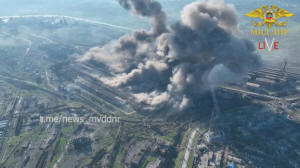Ukraine leader appeals for truce to dig out civilians trapped under
steel plant
 Send a link to a friend
Send a link to a friend
 [May 05, 2022] By
Natalia Zinets [May 05, 2022] By
Natalia Zinets
KYIV (Reuters) - Civilians will need to be
dug from bunkers under a steel works that is the last holdout of
resistance in Ukraine's Mariupol, President Volodymyr Zelenskiy said on
Thursday, after a Russian bombardment that has littered the area with
concrete debris.
Having failed to capture the capital Kyiv in the early weeks of an
invasion that has killed thousands and flattened towns and villages,
Russia has accelerated attacks in southern and eastern Ukraine,
including on the Azovstal steel works in Mariupol.
Ukraine's resistance at the plant underscores Russia's failure to
capture major cities in a war that has united Western powers in arming
Kyiv and punishing Moscow with sanctions. Sweden and Finland are
expected to decide very soon whether to join NATO, in what would be a
major historical shift.
Russia's military promised to pause its activity in Azovstal during
Thursday daytime and the following two days to allow civilians to leave,
after what Ukrainian fighters described as "bloody battles" prevented
evacuations on Wednesday. The Kremlin said humanitarian corridors from
the plant were in place.
Ukrainian officials believe around 200 civilians remain trapped along
with fighters in the network of underground bunkers at the sprawling
Soviet-era Azovstal complex.

In an early morning address, Zelenskiy said Ukraine stood ready to
ensure a ceasefire in Mariupol, a port city that after a weeks-long
siege Russia controls - apart from the steel works.
"It will take time simply to lift people out of those basements, out of
those underground shelters. In the present conditions, we cannot use
heavy equipment to clear the rubble away. It all has to be done by
hand," Zelenskiy said.
Ukrainian fighters inside Azovstal are fighting "difficult, bloody
battles," Denis Prokopenko, a commander with Ukraine's Azov regiment,
said late on Wednesday.
Ukraine's military general staff said the assault on the plant included
air support, and pictures released by Russian-backed fighters appeared
to show smoke and flames enveloping it.
"God forbid more shells hit near the bunkers where the civilians are,"
said Tetyana Trotsak, an Azovstal evacuee among dozens who reached a
Ukraine-controlled town this week, describing her two-and-a-half hour
walk to get across a short stretch of ground strewn with rubble at the
plant.
Mariupol has been an important target in Russia's efforts to cut Ukraine
off from its Black Sea grain and metals export routes, as well as to
link Russian-controlled territory in the east of the country to Crimea,
seized by Moscow in 2014.
The United Nations and Red Cross evacuated hundreds of people from the
city and other areas this week.
Nobody from Azovstal was among more than 300 civilians evacuated on
Wednesday from Mariupol and other areas in southern Ukraine, the U.N.
humanitarian office said.
We "stand ready to help" any trapped civilians, Jens Laerke,
spokesperson for the office, said in an email.

SWEDEN EYES NATO
Sweden and neighbour Finland stayed out of NATO during the Cold War, but
Russia's invasion of Ukraine has prompted them to rethink their security
arrangements.
Sweden received U.S. assurances that it would receive support during the
period that a potential application to join NATO is processed by the 30
nations in the alliance, Foreign Minister Ann Linde said on Wednesday.
[to top of second column]
|

An aerial view of rising smoke after a possible shelling of Azovstal
complex, in Mariupol, Ukraine, in this still image from a handout
video acquired by Reuters on May 5, 2022. Ministry of Internal
Affairs Donetsk People's Republic/Handout via REUTERS

Russian President Vladimir embarked on the war partly
to counter the expansion of the NATO alliance, which Ukraine also
wants to join.
Sweeping sanctions from the United States and its European allies
have hobbled Russia's $1.8 trillion economy while billions of
dollars worth of military aid has helped Ukraine frustrate the
invasion.
The United States has provided details on the
location of Russia's mobile military headquarters, allowing
Ukrainian forces to strike those targets and kill Russian generals,
the New York Times reported on Wednesday, citing senior U.S.
officials.
Ukrainian officials said they have killed about 12 Russian generals
on the battlefield, the newspaper said. The Pentagon and the White
House did not immediately respond to Reuters' requests for comment
on the report.
A source said EU envoys could reach a deal as early as Thursday on a
plan to phase out imports of Russian crude oil within six months and
refined products by the end of this year. It requires agreement by
all 27 EU governments.
The plan also targets Russia's top bank, its broadcasters, and
hundreds of individuals. It would follow U.S. and British oil bans
and be a watershed for the EU, the world's largest trading bloc,
which remains dependent on Russian energy.
The Kremlin said Russia was weighing responses to the EU plan, which
it said would be costly for European citizens.
BATTLES
Ukraine and Russia said fighting had been heavy across the south and
east over the past day.
Ukrainian authorities reported shelling of towns near a frontline
that divides territory it holds in the Donetsk and Luhansk regions
from land held by Russian-backed separatists.

The Ukrainian air force claimed to have downed three Russian cruise
missiles and four aircraft, including two Sukhoi fighter jets.
Russia said it had killed 600 Ukrainian soldiers overnight. Reuters
could not independently verify the battlefield reports by either
side.
Pavlo Kyrylenko, governor of the eastern Donetsk region in which
Mariupol is located, said at least 25 civilians were wounded as
Russian forces shelled Kramatorsk, a town that in April suffered a
missile strike on a train station that killed dozens of evacuating
civilians.
A school and a kindergarten were damaged in the new attack, the
town's mayor said.
Russian missile strikes in recent days have included railway
stations in an attempt to target Western arms transfers and fuel
depots.
More than five million Ukrainians have fled abroad since Putin
launched the invasion on Feb. 24. Millions more are displaced inside
Ukraine.
Russia calls its actions a "special operation" to disarm Ukraine and
protect it from fascists. Ukraine and the West say the fascist
allegation is baseless and that the war is an unprovoked act of
aggression.
(Additional reporting by Emma Farge in Geneva and Reuters bureaus;
Writing by Frank Jack Daniel; Editing by Gareth Jones)
[© 2022 Thomson Reuters. All rights
reserved.]
This material may not be published,
broadcast, rewritten or redistributed.
Thompson Reuters is solely responsible for this content. |